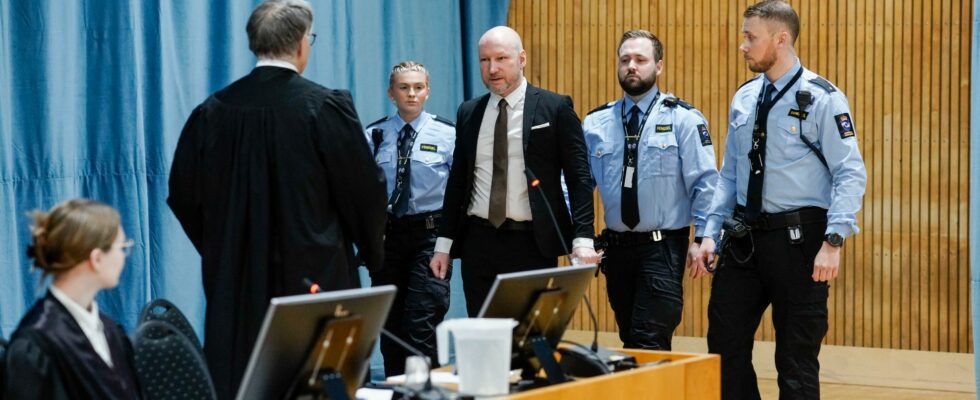“Suicidal” and on antidepressants according to his lawyer, Norwegian neo-Nazi Anders Behring Breivik, who killed 77 people in 2011, is once again taking the Norwegian state to court as of Monday to protest against his prison isolation. Detained alone in a high-security unit, Breivik believes that his continued isolation for nearly 11 and a half years violates Article 3 of the European Convention on Human Rights, which prohibits “inhuman punishment or treatment.” or degrading”.
On July 22, 2011, the extremist, now 44 years old, first detonated a bomb near the government headquarters in Oslo, killing eight people, then killed 69 other people, most of them teenagers, in opening fire on a Labor Youth summer camp on the island of Utøya. He was sentenced in 2012 to the maximum sentence at the time, 21 years in prison with the possibility of extension.
In contact with only two inmates
Since then, “he is still in solitary confinement and, the more time passes, the more this constitutes a violation of the Convention”, his lawyer, Øystein Storrvik, told AFP in October. In court documents, his lawyer had argued that “the long period of isolation and lack of real interaction is now resulting in (psychological) damage for Breivik, including the fact that he is now suicidal. He is now dependent on the antidepressant Prozac to survive his days in prison,” he says.
According to him, Breivik currently only has contact with two other inmates, whom he sees for an hour every two weeks under close supervision, and with prison staff. Invoking another article of the Human Rights Convention which guarantees a right to correspondence, the right-wing extremist also calls for a reduction in the filtering of his letters with the outside world.
In 2016, he had already attacked the Norwegian State on these same two grounds and had, to everyone’s surprise, partially won his case at first instance. But his appeal was then completely dismissed and the European Court of Human Rights (ECHR) ruled his complaint “inadmissible” in 2018.
Recurring provocations
The State justifies Breivik’s relative isolation by his dangerousness and the need to protect itself against the risks he poses for society, other prisoners and guards, but also those who weigh on him. The Norwegian prison system traditionally places great emphasis on the rehabilitation of criminals.
The famous prisoner benefits from “a very complete range of activities” (cooking, games, walks, basketball…) and “there is no indication that Breivik suffers from physical or mental problems due to his conditions of confinement. detention,” argues state lawyer Andreas Hjetland.
“Breivik has so far shown little receptiveness to rehabilitation work,” he also specifies. “It is therefore difficult to imagine what significant improvements in detention conditions are possible and justifiable in the short term.” Breivik’s public appearances often give rise to provocations (Hitler salute, militant signs, ideological tirades, etc.) which are painfully experienced by the victims’ families and survivors.
